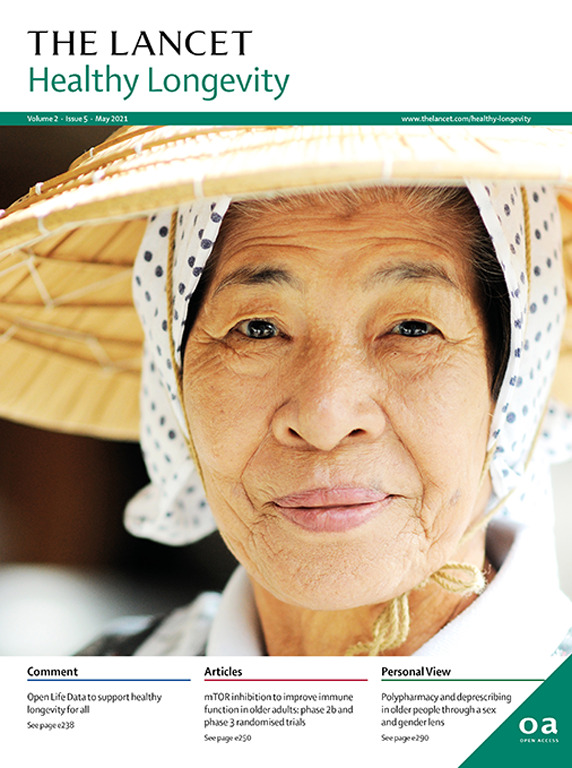Effectiveness of comprehensive geriatric assessment with extensive patient coaching for improving quality of life in older patients with solid tumours receiving systemic therapy (G-oncoCOACH): a multicentre randomised controlled trial
IF 14.6
Q1 GERIATRICS & GERONTOLOGY
引用次数: 0
Abstract
Background
Comprehensive geriatric assessment (CGA) has demonstrated numerous benefits in older patients with cancer, and is internationally recommended, but more data are needed on its impact on quality of life (QoL). The aim of the G-oncoCOACH study is to evaluate the effectiveness of CGA on QoL in older patients with solid tumours receiving systemic therapy by integrating a geriatric team for implementing geriatric assessment (GA)-based recommendations and offering extensive patient coaching compared with standard of care in oncology.
Methods
The G-oncoCOACH study was a multicentre randomised controlled trial conducted in two academic hospitals in Belgium. Patients aged 70 years or older with solid tumours initiating systemic therapy with curative or non-curative intent, and physician-estimated life expectancy of at least 6 months, were randomly assigned (1:1) to either the control group (standard oncology care; receiving GA-based recommendations implemented by the oncology team) or the intervention group (receiving GA-based recommendations implemented by a geriatric team and intensive patient coaching). There was no masking of participants, physicians, or study personnel. The primary outcome was change in global health status (GHS) from baseline to 6 months, measured using the EORTC QLQ-C30 questionnaire (ie, QoL GHS). Linear mixed models were used for data analysis. Exploratory analyses evaluated predictors for change in QoL GHS. The trial is registered with ClinicalTrials.gov (NCT04069962), and is completed.
Findings
Between Oct 30, 2019, and Aug 5, 2021, 217 participants were enrolled and randomly assigned, of whom 212 had QoL GHS available at baseline (107 in the control group, 105 in the intervention group). Among these 212 participants, the mean age was 76·7 years; 111 (52%) were female and 101 (48%) male. The three most common tumour types were lung cancer (41 [19%]), colorectal cancer (31 [15%]), and breast cancer (22 [10%]). The mean difference in QoL GHS score between the intervention group and the control group at 6 months was 10·9 points (95% CI 3·7–18·0; p=0·0030) in favour of the intervention group, and confirmed by a sensitivity analysis. Adherence to GA-based recommendations was higher in the intervention group (71 [65%] of 110 recommendations implemented) than the control group (67 [45%] of 148 recommendations implemented). Exploratory analyses revealed significant predictors for change in QoL GHS, such as low baseline QoL GHS and high comorbidity.
Interpretation
The G-oncoCOACH study shows that CGA with the integration of a geriatric team for implementing GA-based recommendations and offering extensive patient coaching improves QoL GHS in older patients with cancer compared with standard of care in oncology.
Funding
Stand Up to Cancer (Kom op tegen Kanker).
一项多中心随机对照试验:综合老年评估和广泛患者指导对改善接受全身治疗的老年实体瘤患者生活质量的有效性(G-oncoCOACH)
背景:综合老年评估(Comprehensive geriatric assessment, CGA)已被证明对老年癌症患者有许多益处,并被国际上推荐,但其对生活质量(QoL)的影响还需要更多的数据。G-oncoCOACH研究的目的是评估CGA对接受全身治疗的老年实体瘤患者生活质量的有效性,通过整合老年团队实施基于老年评估(GA)的建议,并提供广泛的患者指导,与肿瘤学标准护理进行比较。方法:G-oncoCOACH研究是一项在比利时两所学术医院进行的多中心随机对照试验。年龄在70岁或以上的实体肿瘤患者开始接受系统性治疗,目的是治愈或不治愈,医生估计的预期寿命至少为6个月,随机(1:1)分配到对照组(标准肿瘤治疗;接受由肿瘤团队实施的基于ga的建议)或干预组(接受由老年团队实施的基于ga的建议和强化的患者指导)。没有对参与者、医生或研究人员进行伪装。主要结局是使用EORTC QLQ-C30问卷(即QoL GHS)测量的全球健康状况(GHS)从基线到6个月的变化。采用线性混合模型进行数据分析。探索性分析评估了生活质量GHS变化的预测因子。该试验已在ClinicalTrials.gov注册(NCT04069962),并已完成。研究结果:在2019年10月30日至2021年8月5日期间,217名参与者被招募并随机分配,其中212名参与者在基线时可获得生活质量GHS(对照组107人,干预组105人)。212名受试者的平均年龄为76.7岁;女性111例(52%),男性101例(48%)。三种最常见的肿瘤类型是肺癌(41例[19%])、结直肠癌(31例[15%])和乳腺癌(22例[10%])。干预组与对照组6个月时生活质量GHS评分的平均差异为10.9分(95% CI 3.7 ~ 18.0;P =0·0030)支持干预组,并通过敏感性分析得到证实。干预组(实施110项建议中有71项[65%])比对照组(实施148项建议中有67项[45%])更坚持基于ga的建议。探索性分析揭示了生活质量GHS变化的重要预测因素,如低基线生活质量GHS和高合并症。解释:G-oncoCOACH研究表明,与肿瘤学标准护理相比,整合老年团队实施基于ga的建议并提供广泛的患者指导的CGA可改善老年癌症患者的生活质量GHS。资助:站起来对抗癌症(Kom op tegen Kanker)。
本文章由计算机程序翻译,如有差异,请以英文原文为准。
求助全文
约1分钟内获得全文
求助全文
来源期刊

Lancet Healthy Longevity
GERIATRICS & GERONTOLOGY-
CiteScore
16.30
自引率
2.30%
发文量
192
审稿时长
12 weeks
期刊介绍:
The Lancet Healthy Longevity, a gold open-access journal, focuses on clinically-relevant longevity and healthy aging research. It covers early-stage clinical research on aging mechanisms, epidemiological studies, and societal research on changing populations. The journal includes clinical trials across disciplines, particularly in gerontology and age-specific clinical guidelines. In line with the Lancet family tradition, it advocates for the rights of all to healthy lives, emphasizing original research likely to impact clinical practice or thinking. Clinical and policy reviews also contribute to shaping the discourse in this rapidly growing discipline.
 求助内容:
求助内容: 应助结果提醒方式:
应助结果提醒方式:


